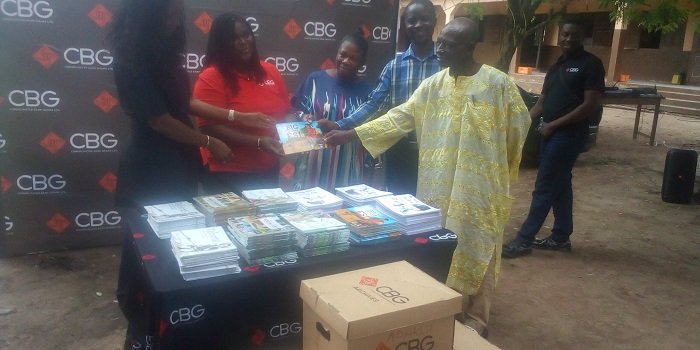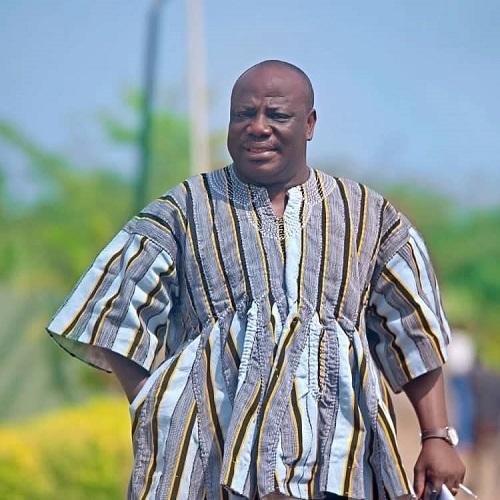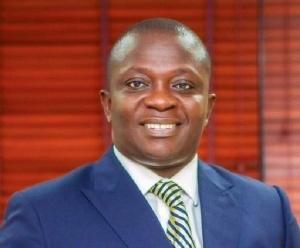News
Consolidated Bank Ghana donates textbooks to Adaklu-Vodze Basic School

The Consolidated Bank Ghana (CBG) has donated textbooks to the Adaklu-Vodze Basic School in the Adaklu District of the Volta Region, to encourage children to cultivate the habit of reading at an early stage to promote their education.
Presenting the books, the Managing Director (MD) of the CBG, Dr Naomi Wolali Kwetey, said the Bank was not only concentrating on financial activities but also committed to the education of children at the basic level.
Dr Kwetey explained that the objective of CBG was to build a strong foundation for children at the basic level of education, particularly to promote the culture of reading among pupils to enable them to engage in a meaningful academic journey.
She stressed that CBG believed that literacy was the foundation on which children built their dreams, therefore the Bank was making conscious efforts to ensure an effective education of children through improved reading abilities that would influence their future.
She said “by providing our children with resources, we support their educational development and instil a sense of pride in their own stories and our shared history,” she stressed.
Dr Kwetey therefore asked pupils to learn hard, and read regularly to let their imaginations run with them, saying it was important to take their lessons seriously to enable them to become responsible adults in future.
Receiving the items, the head teacher of Adaklu-Vodze Basic School, Mr Edward Dzidza, thanked the management of CBG for the gesture, and said the textbooks would definitely promote quality teaching and learning in the school.
Mr Dzidza explained that the school did not have adequate reading materials, compelling two or three pupils to share one textbook, and was happy that the 700 reading materials provided for the school would ensure that each child would get access to one textbook.
From Samuel Agbewode, Adakul- Vodze
Hot!
Minority opposes proposed Telecel-AT merger, describes deal as ‘Unconscionable’

The Minority in Parliament has strongly objected to any planned merger or partnership between the government and Telecel, describing the deal as “technically, operationally, and financially unconscionable.”
Ranking Member on the Communications Committee, Matthew Nyindam, raised the concern during a media briefing in Parliament.
He questioned why both the Minister of Communications and Telecel would publicly announce a merger and then suddenly go silent on the matter.
“We object to any deal with Telecel by way of merger, absorption, or acquisition. This is a scheme to dispose of a national asset to fill private pockets,” Mr. Nyindam stated.
He argued that Telecel has not demonstrated any special technical or operational expertise that staff and management of AT (formerly AirtelTigo) do not already possess.
According to him, Telecel had earlier promised to invest $500 million after acquiring Vodafone Ghana but failed to do so, a situation he fears could repeat itself if the government allows another deal.
Mr. Nyindam claimed that Telecel was already indebted to the tune of $400 million, adding that the company only seeks to benefit from AT’s over three million customers to expand its own base without making any real investment.
“The government must not surrender the capacity of a state-owned company to a private entity through majority ownership. There is no clear plan to protect the jobs and livelihoods of thousands of workers,” he stressed.
The Minority Caucus is therefore calling on the government to halt any discussions or agreements with Telecel regarding the proposed merger, insisting that the deal is not in the national interest.
News
Bryan Acheampong proposes 90-Day ban on Galamsey during campaign tour

Flagbearer hopeful of the New Patriotic Party (NPP), Bryan Acheampong, has called for an emergency 90-day suspension of all forms of mining in Ghana to help restore polluted rivers and water bodies.
He made the call during his campaign tour, where he engaged party members and residents on issues of national concern, including security, the environment, and responsible mining.
Mr Acheampong explained that the temporary ban should take place during the rainy season to allow the environment to recover naturally while the nation rethinks its mining practices.
“Let’s clear our water bodies and engage on how we can go back to mining. I’m not talking about a state of emergency, but mining, regardless of where, should stop now for the next 90 days,” he said.
He warned that illegal mining, popularly known as galamsey, continues to poison food sources and destroy farmlands, posing a major threat to public health and food security.
“If our food systems are being poisoned and we just look on because we prefer to make money, our people will not be around in a very short time to address the situation,” he cautioned.
Mr Acheampong urged government, miners, and local leaders to use the proposed 90-day period to develop a sustainable framework for responsible mining that protects both livelihoods and the environment.
By: Jacob Aggrey






